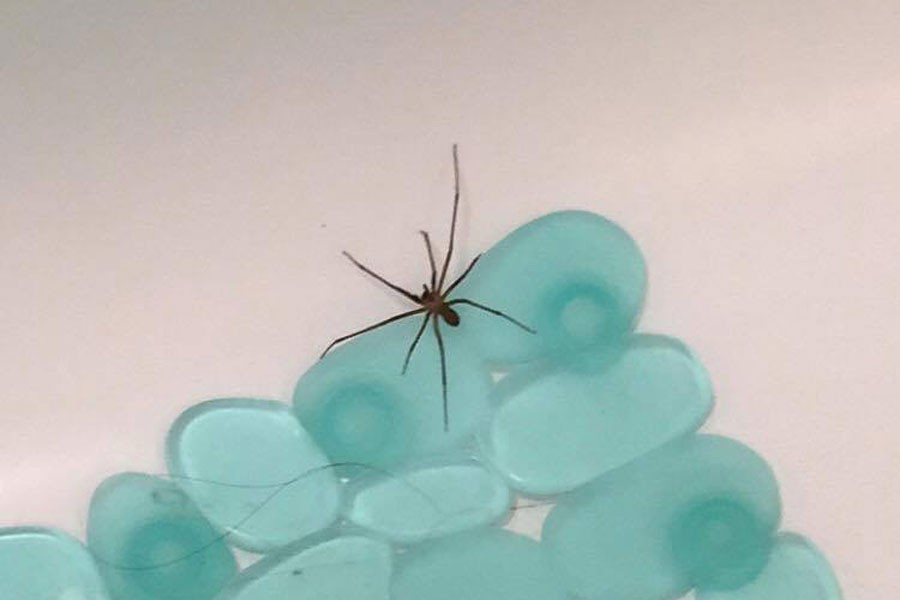UPDATE: Spider issue unresolved
Photo courtesy of Robin Paige Hamby
Campus resident Robin Paige Hamby posted on her Facebook Feb. 22, and wrote that she has found more than 40 brown recluse spiders in her apartment. Housing and Residence Life has offered Hamby and her roommates to move to a different apartment, but they declined.
As of Thursday, campus apartment resident Robin Paige Hamby said after one meeting with Housing and Residence Life, she hasn’t heard anything back about moving into a non-spider-infested apartment.
“We weren’t allowed to break our contract without paying, so (Interim Housing Director Amy Price) said she would look for a new room,” Hamby said. “Two of us want to move into another apartment, and the other two would rather go home and commute. I was told I would receive an email for an open apartment, but I still haven’t.”
On Feb. 22, Hamby posted on Facebook saying that anyone considering living at USI shouldn’t.
“After finding (more than) 40 brown recluse spiders in our apartment last semester, we are still spotting them,” she wrote on Feb. 22. “When we brought the issue up to housing, they treated it as a minor issue.”
The Shield reached out to Hamby and her roommates for comment, but they chose not to respond.
As of Tuesday, 596 people have shared Hamby’s post.
Hamby wrote in the comments of her post that she lives in McDonald East.
“We were constantly paranoid last semester, on top of being stressed from school,” she wrote. “We have found spiders in the showers, in the beds, on clothes and everywhere else. It’s a living nightmare.”
Hamby wrote that Housing and Residence Life sent pest control to spray and dust her apartment every week, but the spiders kept coming.
“I do not want to live in a spider-infested environment, but nothing can be done about it,” she wrote. “It’s sickening to be paying a lot of money to live someplace I’m terrified to be.”
Amy Price, interim director of Housing and Residence Life, and Marcia Kiessling, associate provost for Student Affairs, said they offered the girls a chance to move to a different apartment this semester. Price and Kiessling both confirmed March 1 that the girls declined to move, which contradicts Hamby’s more recent account.
“One of the things I mentioned to the residents was if they would move, then I would be able to treat that apartment differently (for spiders) than if they are still occupying it,” Price said. “There’s more we can do for spiders, but I can’t when someone’s living there.”
She said typical spraying treatment works to kill normal bugs and spiders, but brown recluses can “just walk over it.”
“I was very honest when talking to the students (affected),” Price said. “I told these girls I can help them find a space to live on campus where they would feel more comfortable or better, but I can’t promise I can get rid of those spiders while (the girls) are still living there.”
She said a couple years ago, Housing did face a similar concern, albeit in a different building. When there are brown recluses on campus, she said they’re always confined to one building per instance.
“For insects, you want to keep things off the floor and have a clean living space,” Price said. “But really, you can’t stop this type of spider because of how difficult it is to kill them.”
She said there is one free apartment where all four of the girls could move, but right now, the girls “like where they’re living.” The free apartment is not renovated yet and will not be until the summer of 2017.
“Noble in O’Daniel South isn’t as nice as where these girls live now,” Price said. “I understand their apprehension, but did try to encourage them to move.”
She said she isn’t surprised about a spider problem this time of year.
“(Spiders) were here in August and September, and the apartment had been treated,” Price said. “The students didn’t see any in December and January, but are starting to see them back now.”
Price said when bitten by a brown recluse, some people have a medical reaction.
According to the U.S. National Library of Medicine, common symptoms include chills, itching, fever, nausea and a large sore.
In rare cases, a brown recluse bite can result in seizures, comas, blood in urine, jaundice and kidney failure.
“If brown recluses are found in an apartment, we want to know about it,” Price said. “We want students to either fill out a work order, tell an RA or area coordinator or call (Housing) directly.”
She said Housing sends a pest control service out to any infested apartments every Wednesday.
“One thing that keeps me up at night is that some students may not have a positive living experience here,” Price said. “(The social media posts) were why I wanted to meet with these students. What I want to do is learn how to make living here a more positive experience.”
The Student Government Association addressed Hamby’s Facebook posts at its meeting Feb. 25.
Aaron Gottman, administrative vice president for University Affairs, said a former SGA member messaged him to let him know about the posts.
“If Housing is taking care of it, I don’t see a reason why SGA can’t be in the discussion so we can be a good segue to talking to students,” Gottman said.
He said he hopes SGA will help students voice their concerns and also be informed about how the university is responding.
“I hate that the university is being thought about in a negative light,” Gottman said. “I hope SGA can help clear up things.”



